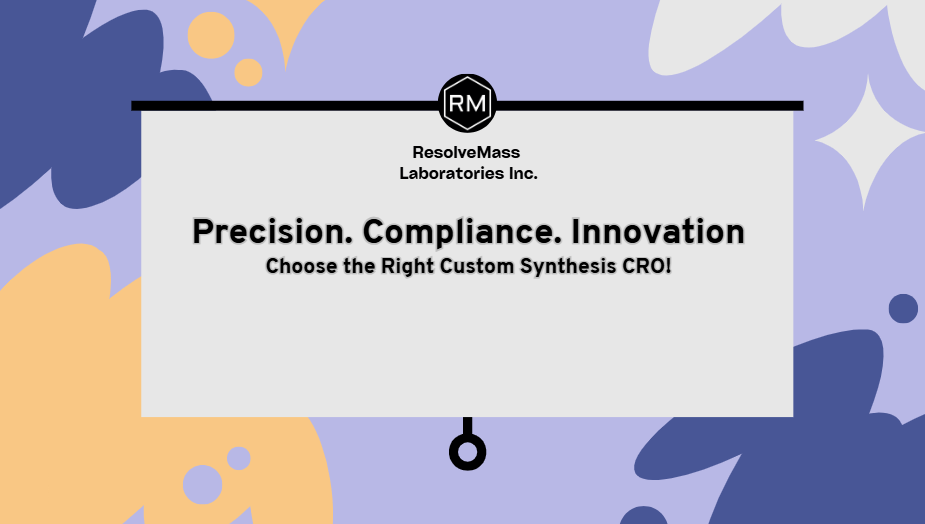
The demand for custom synthesis contract research organizations (CROs) is rising as pharmaceutical, biotechnology, and chemical industries seek specialized services for research, development, and production. Selecting the best Custom Synthesis CRO is crucial for ensuring quality, compliance, and successful project outcomes. This guide provides a detailed roadmap to help organizations choose the best CRO for custom chemical synthesis while meeting regulatory and industry standards.
Understanding Custom Synthesis CROs
A Custom Synthesis CRO specializes in the design, synthesis, and scale-up of small molecules, large molecules, polymers, and complex organic compounds tailored to the needs of pharmaceutical, biotech, and materials science companies. These organizations support R&D programs by offering expertise in synthetic route development, impurity profiling, API synthesis, and analytical validation.
Key Roles of a Custom Synthesis CRO
- Custom molecule development: Design and synthesis of novel and reference standards
- Process optimization: Enhancing synthetic pathways for cost-effective production
- Analytical support: Comprehensive characterization of compounds using NMR, HPLC, LC-MS, and other techniques
- Regulatory compliance: Ensuring synthesis processes meet cGMP and ICH guidelines
- Scale-up services: From milligram to kilogram quantities for early-stage to commercial production
Factors to Consider When Selecting a Custom Synthesis CRO
Choosing the right CRO requires evaluating their capabilities, quality standards, and regulatory adherence. Below are critical factors to consider:
1. Expertise and Technical Capabilities
- Synthetic Chemistry Expertise: Ensure the CRO has expertise staff in complex molecule synthesis, asymmetric synthesis, and chiral chemistry.
- Analytical Capabilities: Look for comprehensive analytical services such as NMR, MS, FTIR, TGA, and HPLC.
- Process Development Skills: Ability to scale up reactions from laboratory to production scale efficiently.
2. Regulatory Compliance and Certifications
- GMP/GLP Compliance: The CRO should follow Good Manufacturing Practices (GMP) and Good Laboratory Practices (GLP).
- FDA, EMA, and ICH Guidelines: Ensure adherence to international regulatory standards.
- Data Integrity and Traceability: Documentation must meet ALCOA+ principles (Attributable, Legible, Contemporaneous, Original, and Accurate).
3. Quality Assurance and Control Measures
- Validated Analytical Methods: Look for robust method validation and impurity profiling.
- Batch-to-Batch Consistency: Ensuring reproducibility across multiple synthesis batches.
- Environmental and Safety Standards: Compliance with REACH and OSHA safety protocols.
4. Customization and Flexibility
- Bespoke Solutions: The CRO should tailor synthesis strategies to client needs.
- Scalability: Ability to adjust production volumes as required.
- Confidentiality Agreements (NDAs): Protecting intellectual property and research data.
5. Cost and Timelines
- Transparent Pricing: Avoid hidden costs and ensure competitive pricing models.
- Project Timelines: Ensure the CRO can meet R&D and production deadlines.
- Supply Chain and Logistics: Efficient sourcing of raw materials and shipment of final products.
6. Reputation and Client Feedback
- Case Studies and References: Check client testimonials and past projects.
- Industry Experience: Years of operation in pharmaceutical, biotech, and specialty chemicals.
- Certifications and Accreditations: Look for ISO certifications and regulatory compliance reports.
Ensuring Quality and Compliance in Custom Synthesis
Ensuring high-quality synthesis while complying with regulatory requirements is paramount. Here are some steps to achieve this:
1. Implementing Stringent Quality Control (QC) Protocols
- Using high-resolution analytical techniques such as LC-MS, GC-MS, and XRPD.
- Conducting stability studies for compound durability.
- Establishing risk assessment frameworks for impurity profiling.
2. Regulatory Audits and Inspections
- Conducting internal audits to ensure compliance with FDA, EMA, and ICH.
- Allowing client inspections and third-party audits.
- Maintaining batch records and electronic documentation systems.
3. Partnering with Reputable Suppliers
- Sourcing high-quality starting materials from certified vendors.
- Conducting supplier audits and material verification.
- Ensuring traceability and chain of custody records.
4. Continuous Process Optimization
- Implementing green chemistry approaches for sustainable synthesis.
- Enhancing yield and reaction efficiency.
- Using automated synthesis platforms to minimize errors.
Future Trends in Custom Synthesis CRO Services
The custom synthesis industry is evolving with innovations that enhance efficiency and sustainability. Key trends include:
- AI-driven Drug Discovery: Machine learning tools for predicting synthetic pathways.
- Green Chemistry Initiatives: Reduction of solvent waste and hazardous reagents.
- Flow Chemistry: Enhancing reaction control and yield improvement.
- CRISPR and Gene Editing: Expanding custom synthesis applications in biotech.
LET’S CONNECT
At ResolveMass Laboratories Inc., we offer world-class custom synthesis services tailored to your research and manufacturing needs. Contact us for expert solutions in small molecule synthesis, analytical testing, and regulatory compliance.
REFERENCES
- SCHNEIDER G. CRO.
- Nichol FR. Contract clinical research: value to in-house drug development. InClinical Drug Trials and Tribulations, Revised and Expanded 2002 Mar 26 (pp. 370-380). CRC Press.
- Xia C, Gautam A. Biopharma CRO industry in China: landscape and opportunities. Drug Discovery Today. 2015 Jul 1;20(7):794-8.

